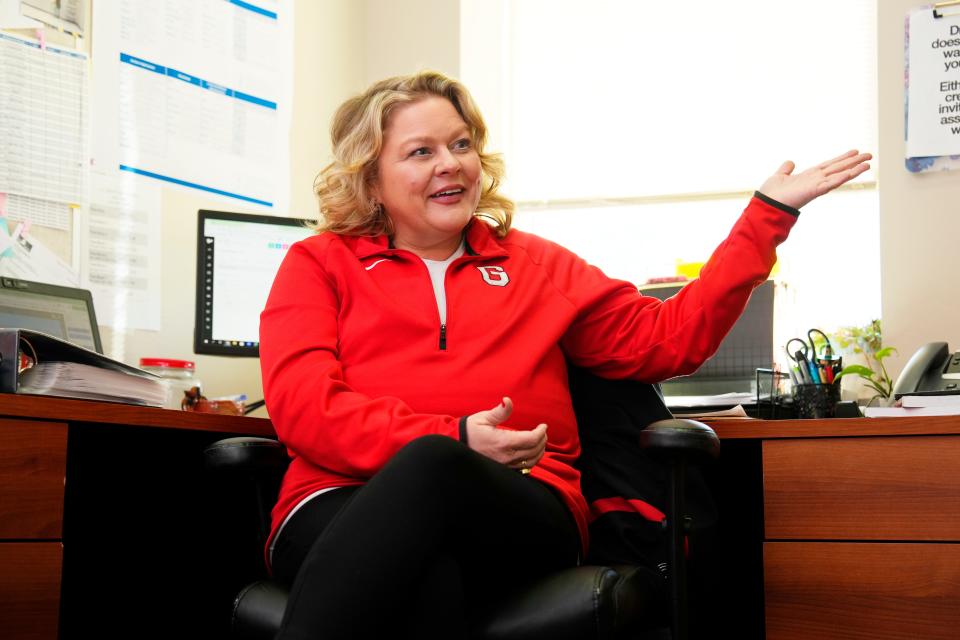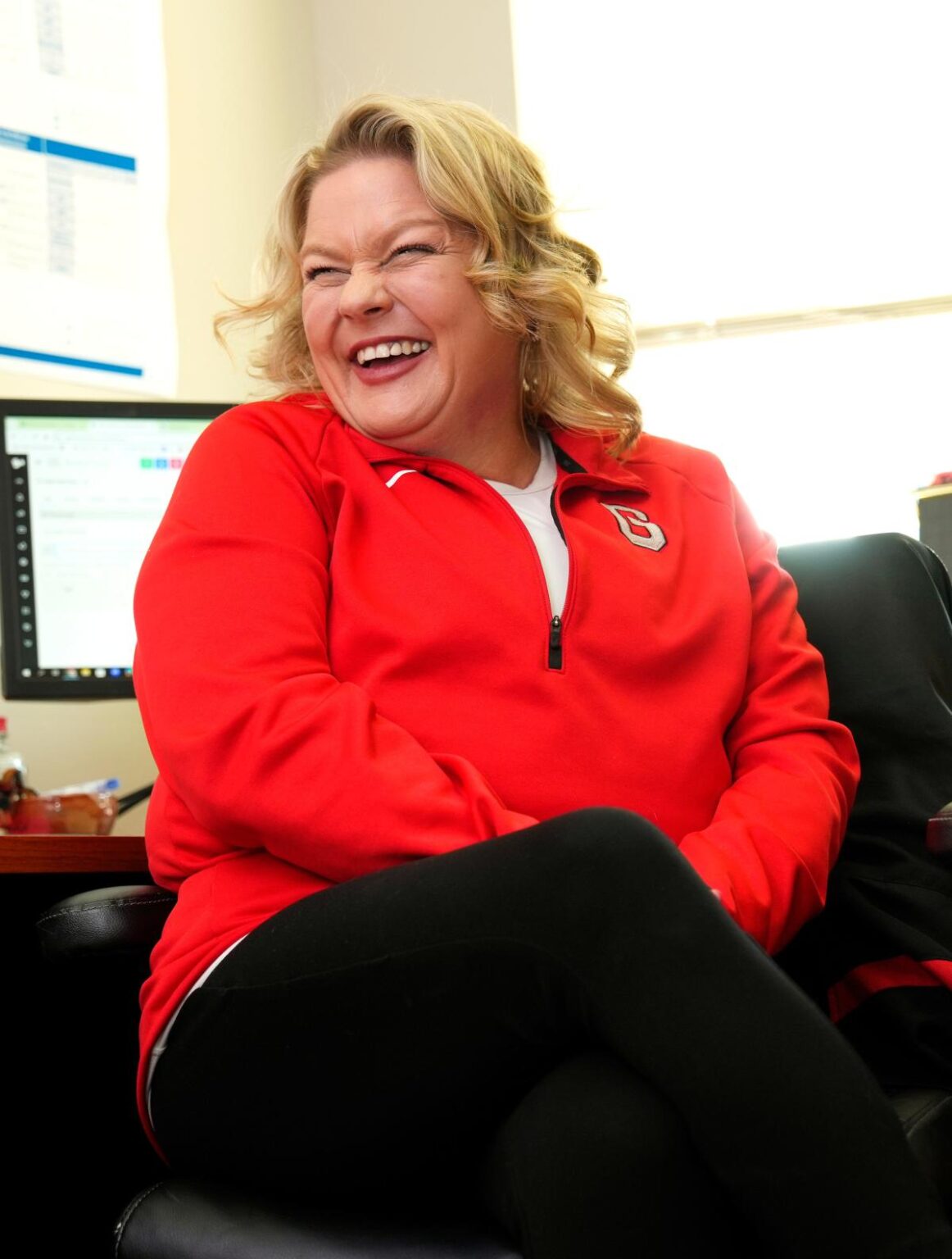Cyndi Thomas works in a comfortably cluttered high school office with activity buzzing all around. Students zip by in the corridor. Some wave if they see her through the window next to her door. Some peek in to see if she’s occupied.
The tools of her trade are low-tech: loose-leaf binders, policy manuals, inspirational posters, plastic puzzles, comfy seating, a blanket, a box of tissues. But in many respects Thomas is the air traffic controller at the center of a complex and often high-tech system designed to accomplish one of Oklahoma’s most important goals — giving its children the education that will help them succeed in life.
Thomas is a guidance counselor, one of 115 in the Oklahoma City Public Schools district. She works at U.S. Grant, a boxy red-brick, four-year high school on Oklahoma City’s south side, in a neighborhood that is strongly, if not predominantly, Latino. Many of its 1,700 students speak Spanish as well or better than they do English. While being bilingual is an asset in the real world, it represents a handicap to many trying to pass examinations — a particular problem in more diverse metropolitan areas of the state.
A report released in October indicated Oklahoma high school students were 49th in the nation in ACT test scores. ACT is an assessment that tests students on their understanding of their high school curriculum and covers coursework in English, reading, math and science.
“We need to do something,” was a common refrain among the comments of readers who participated in a non-scientific survey conducted by The Oklahoman and gave state schools Superintendent Ryan Walters an “F” for his performance in office to date.
U.S. Grant itself received an overall “D” grade on the most recent Oklahoma State Report Card from the Oklahoma State Department of Education, with a high level of absenteeism, low academic achievement and little progress in English language proficiency.
But to Thomas, who came to U.S. Grant seven years ago, “it has a special place in my heart. I love this place.”
U.S. Grant High School’s Cyndi Thomas was a teacher before she became a school guidance counselor.
Q: Were you a teacher before you became a counselor?
A: I was. I grew up in Bethany, went to the University of Central Oklahoma, where I got my bachelor’s in special education. I taught special ed in middle school for about seven years, and then I went back to school and got my counseling, guidance degree and became an elementary school counselor for about four years. Then left education for a bit. I got my therapy license and was a professional counselor for about four years as a contractor for a mental health agency before I decided to come back. I feel like education is my wheelhouse. It’s what I’m good at.
Q: What particular challenges do you see here in a school in a neighborhood where English is a second language for many?
A: A lot of kids have been here for a while, and they’ve picked up the language really well, but others are coming to us from their home countries for the first time and don’t speak any English. We have classes here to accommodate that. We have teachers that speak Spanish, and the instruction is in Spanish to help support the students while they’re acquiring English skills. Our hope is to transition them into more traditional classroom settings as soon as they’re able to.
Q: As you know, Oklahoma ranks near the bottom in fourth-grade reading skills tested across the nation. Does that have an impact at the high school level? Do you see a lot of kids coming in without a lot of the basics?
A: That’s definitely a problem. I’ve seen it in other districts and we see it here, for sure. We do have remedial classes, but not as many as I would like. I wish we could offer more, but a lot depends on teacher allocations and teacher certifications. But we definitely have remedial math and remedial English reading groups.
Q: This is also a neighborhood with a high percentage of families with both parents working. How does that affect the level of involvement and assistance of parents?
A: It’s not lack of involvement by choice. It’s a matter of necessity. We have a lot of working parents, and we have a lot of working students. A lot of my students are little adults. They’re taking care of siblings, nieces, nephews. A lot of them are working along with their families. They’re going to work with Mom or Dad when they’re not here at school. We try to encourage involvement with family nights, and we invite parents in. Something I’ve tried to do since I’ve been here is to get the community more involved.
I think that’s needed for a successful school. There’s a church across the street, and they have been very active the last couple of years, helping us out when we need volunteers. We used to have a position for family liaison, it was called, and some schools still have that. But I don’t think we can work that into our budget this year.
Q: A lot of attention has been focused on low school performance grades and how they can be improved. What is your role in that effort?
A: As counselors, I think one thing we can do to help that grade is in attendance. If I have a kid that doesn’t go to class, I’m going to pull them in and try to talk to them and find out what motivates them and find out how to get them back.
I had a kid one time who wasn’t going to class. I kept calling him, emailing him. Finally, he showed up in my office. He’s, like, “what do you want?” And I started talking about attendance. He pulled out a business card and handed it to me and said, “Miss, I’m working. I’m making $200 a day. I can’t be here.”
We also have a student advisory committee, where kids can talk to their peers about what’s going on. Maybe it’s something at home or a transportation issue. That’s been helpful. I try to do early interventions as much as I can, if I see a kid that is really off track.
Q: Is your role one of inspiration? Helping students raise their horizons and imagine themselves in top colleges, top jobs?
A: Yes, that’s a big piece of it. We really have to set them up with a plan, and I don’t think a lot of students realize how important it is to start at the freshman year, which is so important. If you start off well, it opens up a lot of doors.

U.S. Grant High School guidance counselor Cyndi Thomas is in some ways the air traffic controller at the center of a complex system designed to give children the education that will help them succeed in life.
Q: From your point of view, what are the most important steps schools could take to improve their performance?
A: It’s complicated. I could use about 24 hours more in the day to get things done. More counselors would help. I think mental health needs have increased quite a bit. Social media puts a lot of pressure on kids. The school’s principal absolutely makes a big difference. I will say that in my time at Grant, all three principals have been really good.
I think it all starts at the top and trickles down. I think the principal, especially here, is like the mayor of a small town, and she’s trying really hard to build a sense of community.
This article has been edited for length and clarity.
William C. Wertz is deputy Viewpoints editor. You can reach him with comments and story ideas at wwertz@oklahoman.com. Send him a note if you have any suggestions about others in the community our readers should “get to know.“
This article originally appeared on Oklahoman: Meet Cyndi Thomas, an OKC high school guidance counselor
Read the full article here


